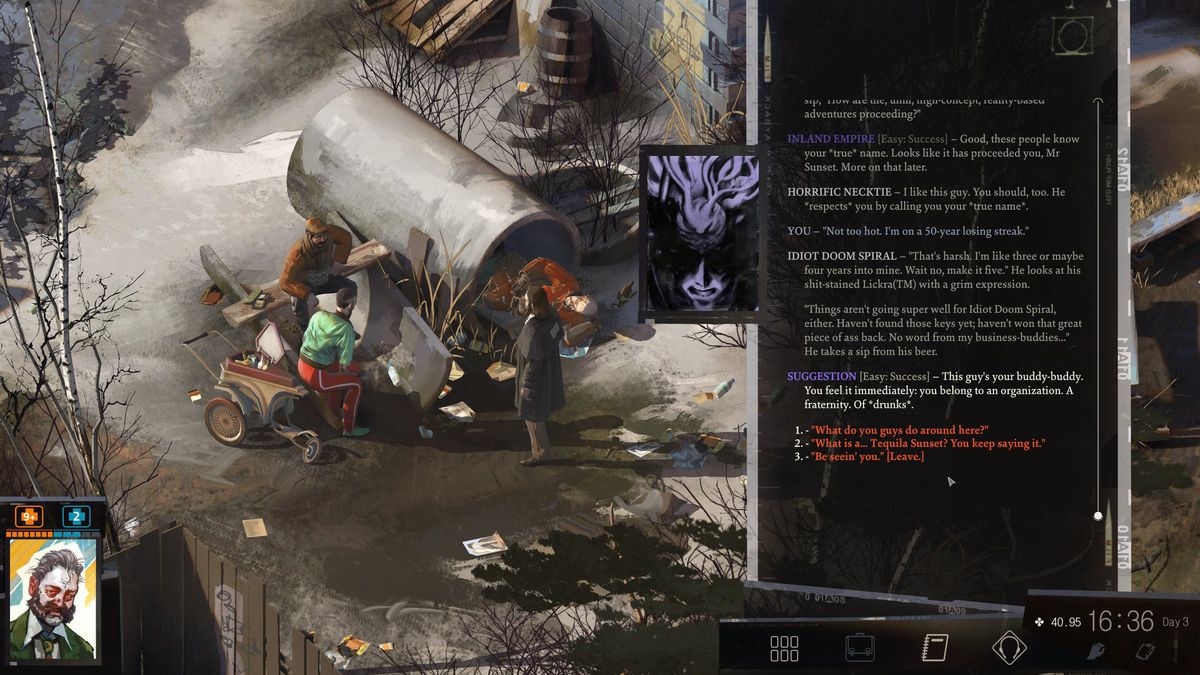At some point during my time with Disco Elysium: The Final Cut, after I read yet another minutes-long dialogue sequence to try and learn more information about the game’s murder mystery, I realized I felt like I was slowly working my way through a long novel — one that went just a little bit over my head.
In The Final Cut, an enhanced version of the 2019 cult hit role-playing game that made its console debut on PlayStation in March, you play as a cop with amnesia investigating a murder case about a hanged man. You’ll explore a fictional place called Revachol and talk to a huge cast of characters to piece together clues about the hanged man’s killer.
Almost every conversation or interaction has an extensive dialogue tree, allowing you to respond to or direct a conversation in ways that can influence other moments in the game down the line. One time, I convinced somebody to give me the jacket off their back, which I could then wear. With another person, I refused money so that my character wouldn’t feel indebted to him.
:no_upscale()/cdn.vox-cdn.com/uploads/chorus_asset/file/22481851/image__1_.jpeg)
Occasionally, these interactions can drag on, feeling a bit like a book chapter that just won’t end. But the game’s writing is sharp and often quite funny, which usually made all of the reading worth it.
Disco Elysium takes place in what I imagine as a parallel universe to ours. Characters frequently reference countries, races, and historical figures that don’t exist in our world but who are core to the societal and ideological makeup. While Disco Elysium’s incredible depth of historical detail made Revachol feel like a real place, at times I struggled to keep facts and information straight.
You won’t just be talking to other people, though: any one of 24 different parts of your personality, like your sense of logic, composure, or authority, can butt into conversations to discuss and debate what’s going on, sometimes even with each other. It’s kind of like Pixar’s Inside Out, if it was a murder mystery.
But like the historical details packed into the game, these traits can also have their own inscrutability. During my playthrough, one attribute sometimes relayed short stories about other police officers. Another, as far as I could tell, was something like a sixth sense about Revachol itself. As each one of your personalities jumps in, you’ll have more text to read. Usually, they add useful context, but other times, I wish they wouldn’t have said anything at all so that I could get to the next part of the game sooner.
:no_upscale()/cdn.vox-cdn.com/uploads/chorus_asset/file/22481865/image__2_.jpeg)
You can also level up each of them as “skills” to give you advantages during the game. I put a lot of points into my empathy skill, for example, which meant that Empathy (the character) would often chime in with advice about how to respond empathetically in a situation.
Putting points into skills also helps with “checks,” where the game rolls a virtual dice to determine if you succeed at an important action. (Saying the right thing in a conversation can help with the potential success of a check, too.) You can retry most failed checks by leveling up a specific skill.
Some checks can only be attempted once, though, and I liked those the best — I always held my breath while I waited to see if I had succeeded or failed. They also felt like they had the most impact on the story itself, particularly near the end, where a dice roll can mean the difference between someone living or dying.
:no_upscale()/cdn.vox-cdn.com/uploads/chorus_asset/file/22481879/image__3_.jpeg)
Overall, the game’s systems make for a fun twist on typical role-playing mechanics. Instead of leveling up external skills like magic power or speed, it really feels like you’re building your character’s personality.
Developer Studio ZA/UM added some new features to the original game, which was first released in October 2019, for The Final Cut. Every line is now fully voiced, and the acting is consistently excellent. There are some new quests that let you explore your character’s political ideologies. And The Final Cut marks the game’s first appearance on consoles, hitting PlayStation 4 and PlayStation 5. (It’s coming to Xbox consoles and Nintendo Switch later this year.) The game was a bit buggy for me on PS5, especially at launch, but Studio ZA/UM has released several patches that have fixed the majority of issues I ran into.
Bugs weren’t the only thing that detracted from my experience, though. The game punts you to a short loading screen every time you transition to a new area, which got annoying over the course of the 24 hours I spent with it. Getting to the quests menu takes three button presses. And the text is very small, even on the largest setting.
But if you’re willing to immerse yourself into the world of Revachol and put up with some small annoyances along the way, Disco Elysium tells a satisfying story that I really enjoyed. Like a huge, epic novel, the game can at times be enigmatic, opaque, and a little too long. But as is often the case for those kinds of stories, it’s well worth slogging through the boring stuff to see the game all the way to its fantastic end. I’m glad I read this one all the way through.
Disco Elysium: The Final Cut is available now on PS4, PS5, PC, Mac, and Stadia. It’s set to release on Xbox One, Xbox Series X / S, and Nintendo Switch later this year.
